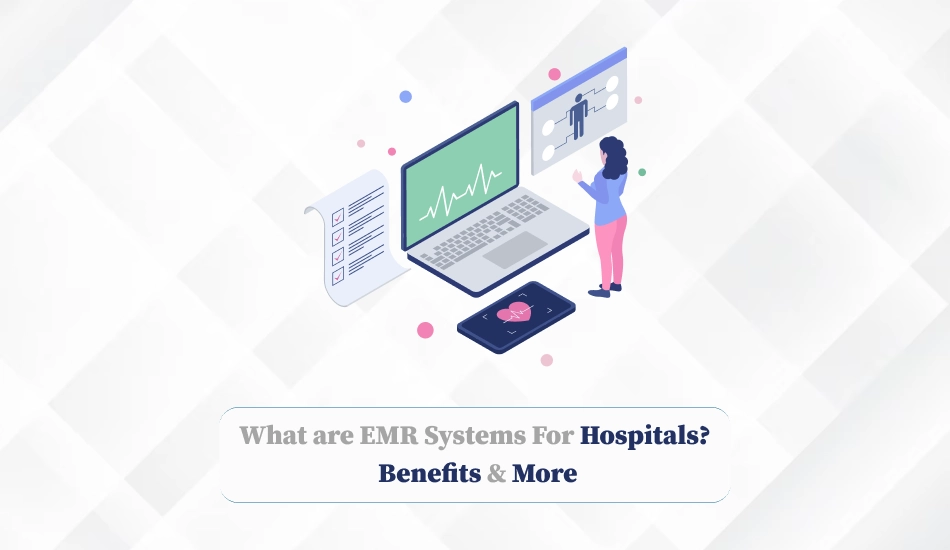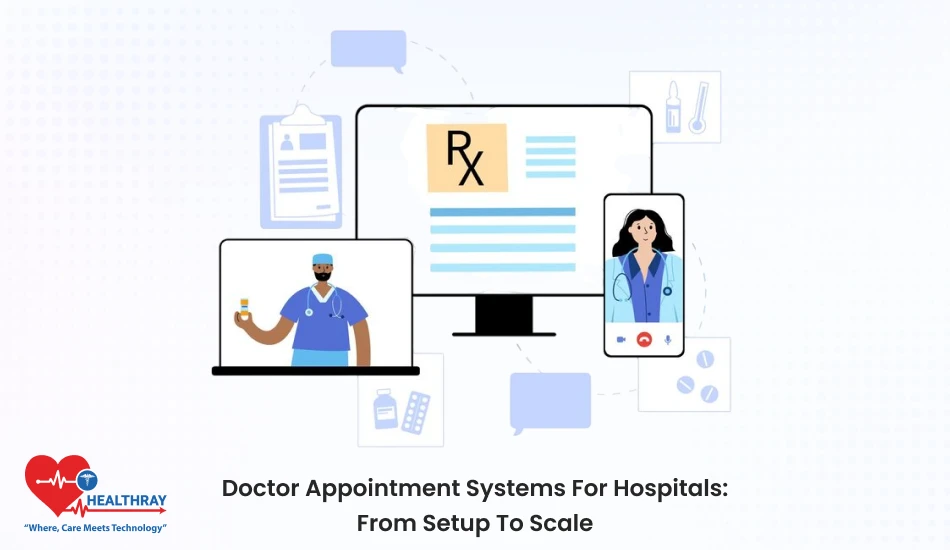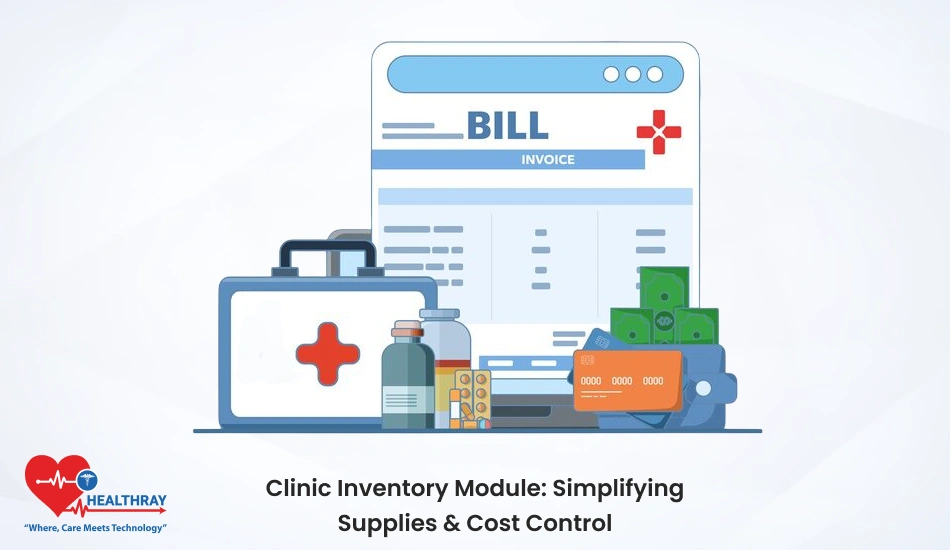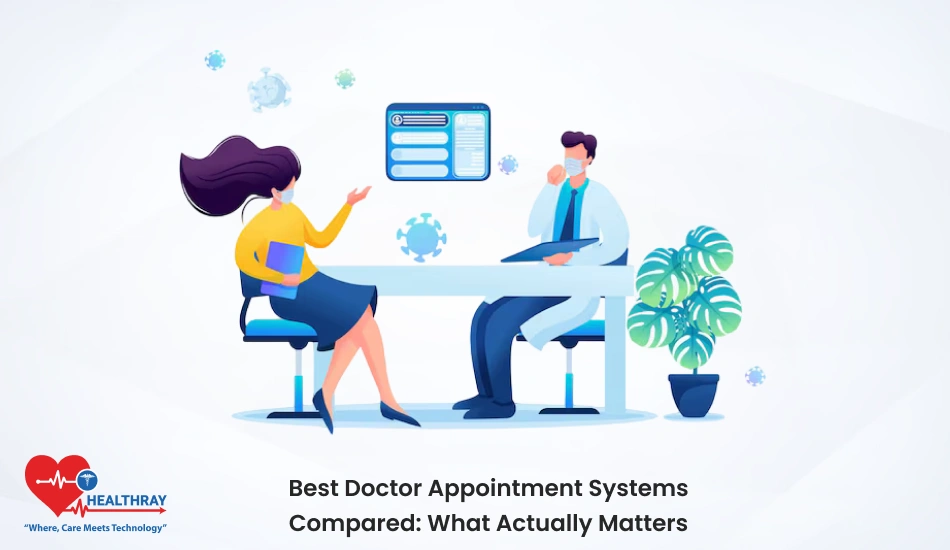Quick Summary : EMR systems for hospitals digitize understanding of information about well-being. They make strides in information precision, openness, and interprofessional collaboration. Benefits incorporate upgraded persistent care and easier workflows. Additionally, a practice management solution and more compelling therapeutic record administration contribute to superior healthcare conveyance.
Introduction
Utilizing the most prominent advances like EMR Software for hospitals that are accessible is basic within the ever-changing healthcare segment. Each touchpoint ought to make an enduring impression on patients. An electronic restorative or electronic health records service or program makes a difference. The more healthcare providers can accomplish this objective. Patients and HCPs are drawn to EMRs because of their benefits. For a long time, we went through manual strategies. Paper-based labor was gone prior to the presentation of EMR, which might sometimes result in repetitive errors.
However, patients’ health, care providers, and healthcare experts are taking full utilization of the preferences advertised by electronic medical records software. As of now, this utilization is significant. EMRs simplify a number of assignments within the troublesome understanding of the confirmation-to-release procedure.
Through this article on EMR/EHR let’s presently look at a number of benefits of electronic medical records.
What are electronic medical records?
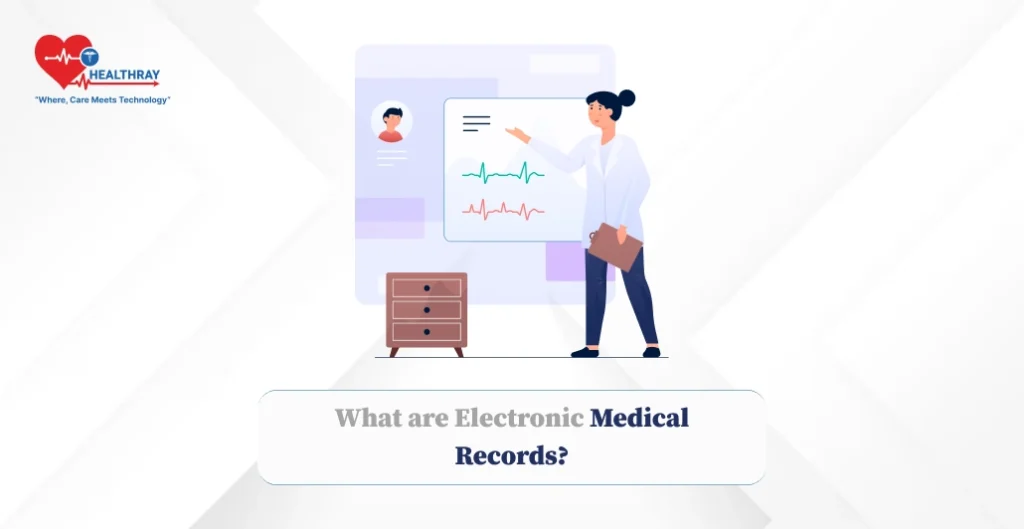
EMR systems for hospitals are intensive files of a patient’s vital history that contain data on socioeconomics, test discoveries, and medicine drugs. These reports ensure that all pertinent patient data is effectively available. They also help healthcare experts make well-informed choices about patient charts. This is with respect to understanding care.
Agreeing with Jay Spitulnik, who is the educating teacher and executive of Northeastern University’s Ace of Science in Well-being Informatics at Bouvé College of Well-being Sciences and Khoury College of Computer Sciences. He stated, “the briefest definition is that it’s the computerized form of a patient’s paper chart and restorative history.” This highlights the significance of digitalizing a patient’s medical records and history.” The foundation of everything you are doing in the field of informatics is an EHR system framework.”
As per Spitulnik, these frameworks serve three essential purposes:
Decide and protect an understanding of electronic health records: Electronic Medical Records (EMRs) give a digital platform access to patient data that’s more compelling, helpful, and secure than the customary approach of keeping data in printed form.
Handle persistent socioeconomics: Electronic Medical Records (EMRs) deliver doctors moments to get to crucial quiet information by centralizing persistent statistical information in one place.
Handle issue records: Electronic Medical Records (EMR) provide therapeutic experts and medical professionals with the capacity to handle issue records, which are records of well-being issues for particular people, as well as bigger frameworks in a strength or clinical system.
Sometime recently, the HITECH Act, which was passed in 2009 to advance the acknowledgment population health, and advancement of well-being data innovation, which EHR systems utilize, was not exceptionally common. The 21st Century Cures Act progressed the circumstance in 2016.
What are the benefits of EMR for hospitals?
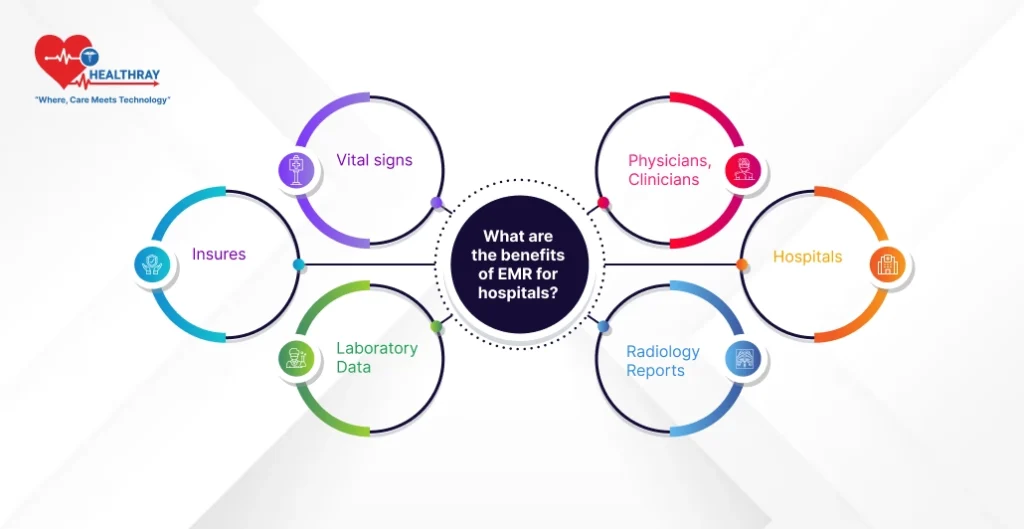
Improves Quality of Care
EMR frameworks encourage quick and easy access to quiet information, empowering healthcare organizations and suppliers to create more educated choices with respect to persistent care.
Here are a few cases of how EMRs improve persistent results:
Check electronic patient medical records for medication conflict. Electronic Medical Records (EMRs) have the capability to screen recent medication drug. They keep track of patients’ drugs and allergies, identifying potential issues or clashes.
Improves emergency care: Emergency medical personnel may get crucial data right away. This is much appreciated by EMRs, such as a life-threatening sensitivity. It empowers them to deliver their patients the right mental health and care first. Indeed, in the event that they are oblivious.
Illuminates safety risks: EMR systems for hospitals caution healthcare facilities and suppliers about potential security dangers. This helps in avoiding serious complications and ultimately improving patient outcomes.
If you are looking for a better data retrieval system and secure platform, the electronic medical records system is the best fit for you. Improves the quality of medical records, keeps the optimal stock, administers healthcare revenue, manages clinical information, and tracks medicine. Moreover, it enhances the ability of decision making, maintains clinical standards, facility for set reminders, and administers appointments information.
According to the Kaiser Family Foundation, around 45% of patients have expressed that the implementation of EMR systems has resulted in an improvement in the quality of patient care. Conversely, only 6% have observed a decrease in the same.
Increases Efficiency
The capacity of EMR systems for hospitals to extend organizational effectiveness within the healthcare industry is one of its most critical preferences. Moreover, a considerable body of inquiry shows that EMRs have yielded a favorable return on investment.
The EHR software decreases the rate of human intervention in performing a task, increasing work capacity and reduces tiredness among employees. Moreover, it retains clinical information and processes appropriately to gain insights. Provides a greater accessibility of clinical documents, preserves a valuable amount of time, and improves clinical efficiency.
EMRs can help in streamlining the taking after normal authoritative methods:
Appointment scheduling: EMRs help maintain a strategic distance from visit blunders (like copy booking) by robotizing the planning patient scheduling process and giving real-time planning overhauls that let specialists improve arrangements or inform patients.
Billing: By naturally making and sending bills to patients and spotting irregularities like copy charges or wrong charging codes, electronic therapeutic records (EMRs) can lower the probability that installments would be lost or deferred.
Patient communication: EMRs, not as it were, make it simpler for patients to get to their therapeutic records, but a patient portal; they are patient portals that moreover empower secure chat stages where patients may inquire questions of their clinicians.
Healthcare specialists may discover it simpler to oversee their workload with these progressions successfully. They moreover halt a parcel of human botches like misplaced patient records or penmanship that’s troublesome to study.
Boosts Patient Engagement
Using software for electronic health records can boost communication and participation between patients and therapeutic experts. EMRs have given patients more noteworthy control over their healthcare by expanding persistent straightforwardness. More individuals are taking charge of medical practice, management of their well-being and connection with their healthcare experts dynamically since this secures access to information on well-being.
Agreeing with Spitulnik, “investigation has illustrated that patients got to be more locked in the more information that’s made accessible to them.”
Typically particularly genuine for the 60 percent of American grown-ups who endure persistent sicknesses that require nonstop care. EMR frameworks offer assistance to clinicians in constructing enduring connections with patients and working together with medical practitioners to help care providers find answers.
Reduces Medication Errors
Specialists are less likely to endorse drugs that may harm patients or clash with current medicines when they have simple access to patients’ therapeutic histories, hypersensitivities, and current solutions. It upgrades persistent security and ensures that restorative experts have the fundamental information to create exact suggestions.
By empowering programmed pharmaceutical endorsing and sending medicine alarms and updates to other healthcare providers and suppliers, electronic therapeutic record frameworks contribute to the decrease of medication mistakes. The therapeutic industry bears the overwhelming toll of restorative mistakes, which sum to nearly $20 billion yearly. Since communication issues are one of the most common causes of therapeutic blunders, EMRs can offer assistance in lowering the costs related to these mistakes.
Enhances Data Security
EMR frameworks spare information in secure, scrambled groups that are, as it were, available by authorized people, giving more information security than paper-based frameworks. Electronic Medical Records System, too, make it conceivable for authorized healthcare suppliers to safely share quiet information, encouraging smooth group communication and bringing down the plausibility of information breaches. Furthermore, these frameworks perform schedule information recuperation and reinforcement strategies, ensuring that quiet clinical data is continuously secure and accessible.
Enhances Data Accessibility
One of the components contributing most to EHR systems’ far-reaching appropriation is their availability. By making it basic for patients and healthcare experts to get vital records from any endorsed gadget, they make strides in accessibility.
In spite of the fact that this moved forward, information openness is invaluable to both groups as the amount of data that’s at their transfer shifts.
Healthcare providers: EHR frameworks make it less difficult for therapeutic experts to treat patients in different places by empowering them to get persistent information from any area with a web association.
Patients: Patients presently have the right to get an advanced duplicate of their therapeutic records through a private and secure electronic well-being electronic health record framework, much obliged to the HITECH Act.
Since EMR frameworks are effectively available, patients have a more prominent impact on their restorative care. According to Spitulnik, “When done right, [EMR frameworks] make data more available to patients.” “It empowers coordinated quiet and caregiver inclusion within the clinical decision support and-making preparation with respect to their care.”
Saves Money
Given that EMR systems for hospitals can be excessive to preserve, there’s a contradiction in the systems’ capacity to spare costs. In any case, there are a number of long-term cost-saving highlights of EMR systems.
Let’s envision, says Spitulnik, that you’ve gone by an office where you had a few symptomatic imaging methods, counting MRIs, CAT filters, and x-rays. “Electronic capacity and transmission are far less costly than keeping a variety of CDs and DVDs in your office that you just have to duplicate and arrange to send to another supplier.”
EMR frameworks can moreover offer assistance to healthcare suppliers to spare cash within the taking after ways:
- bringing down the necessity for frameworks based on paper
- decreasing the sum of time that went through on authoritative work
- Diminishing restorative botches and incompetence
The truth that everything is significantly more shareable than physical duplicates is one of the most cost-saving measures.
Are you seeking the best EMR systems for hospitals and clinics? Know how Healthray can help!
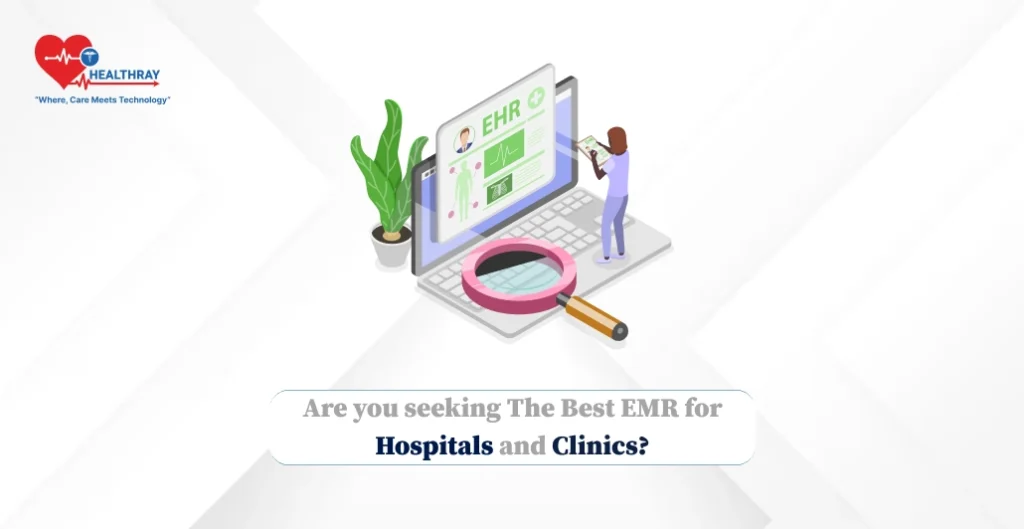
See no encouragement than Healthray. If you’re searching for the most noteworthy Electronic Therapeutic Record (EMR) arrangement for clinics and healing centers.
Healthray is committed to providing smooth healthcare administration. They offer a total Electronic Medical Record Software arrangement that’s custom-made to the particular prerequisites of healthcare offices. Healthray progresses clinical documentation workflows, assists in understanding information organization. It ensures industry compliance with its advanced highlights, easy-to-use interfacing, and solid security measures. Find the viability and constancy of Healthray’s EMR framework, planned to move forward healthcare institutions. Select admirably for the advanced change of your organization. Learn how Healthray can move forward the way you oversee restorative records.
Conclusion
Advanced clinics cannot work without EMR systems for hospitals, which are changing healthcare conveyance. By streamlining quiet data administration, these frameworks move forward by and large care quality, precision, and effectiveness. The points of interest go past keeping up exact records. They also impact clinical judgment, lower botch rates, and advance smooth communication between therapeutic staff individuals. Opportune intercessions are guaranteed by progressed availability to understanding information, and highlights like e-prescribing move forward pharmaceutical administration.
The significance of EMR systems for hospitals is highlighted by their cost-effectiveness, administrative compliance, and upgraded understanding to improve patient engagement. EMRs are driving a more coordinated, patient-centered, and economical healthcare environment as healing centers receive unused innovations. It is fundamental to embrace these strategies in the event that healthcare is to advance within the computerized period.
